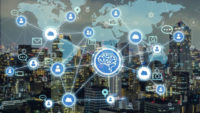World Economic Forum Introduces Global AI Action Alliance
February 1, 2021
The World Economic Forum (WEF), in partnership with 100+ organizations, debuted its Global AI Action Alliance with the mission to “harness the transformative potential of artificial intelligence by accelerating the adoption of trusted, transparent and inclusive AI systems globally.” Its steering committee includes IBM chief executive Arvind Krishna and International Trade Union Confederation general secretary Sharan Burrow, with multinational organizations OECD and UNESCO. The Alliance is the recipient of $500,000 from a Patrick J. McGovern Foundation $40 million grant to support AI and data projects. According to PwC, AI could contribute $15+ trillion to the world economy by 2030.
VentureBeat reports that Kay Firth-Butterfield, WEF head of artificial intelligence and machine learning, said “much good can be done with AI” but that requires “a good governance foundation to garner and maintain public trust.”

“It is our expectation that these projects will explore the frontiers of social challenges that can be solved by AI and through experimentation shape the development of new AI technologies,” said Patrick J. McGovern foundation president Vilas Dhar. The Alliance will “support organizations promoting AI governance and amplify influential AI ethics frameworks and research.”
In 2019, the WEF also created the Global AI Council with participation from Uber chief executive Dara Khosrowshahi and Microsoft vice president Brad Smith. Prior to that, the WEF teamed with government officials to create “one of the first known guidelines to help people within public agencies weigh risk associated with acquiring AI services from private market vendors.”
VB notes that, “unregulated AI is also a threat to the survival of democracy itself at a time when the institution is under attack in countries like Brazil, India, the Philippines, and the United States.”
The World Economic Forum notes that the Global AI Action Alliance is intended to “accelerate the adoption of inclusive, trusted and transparent AI.” PwC added that, AI could add 14 percent to the global GDP by 2030, which would “make AI the biggest economic opportunity of the next decade, representing more value than today’s insurance, oil and gas, commercial real estate, and automotive industries combined.”
It notes that a 2018 Google study “identified 2,602 AI use cases that promote social good, and people are increasingly applying AI to address critical societal challenges including improving agricultural yields, reskilling workers and combatting COVID-19.”
At the same time, “recent controversies on facial recognition, automated decision-making and COVID-19-related tracking have shown that realizing AI’s full potential requires strong buy-in from citizens and governments, based on their trust that AI is being built and used ethically.”
To date, companies and governments have proposed “more than 175 separate sets of principles,” which has created an implementation gap and a learning gap and doesn’t resolve issues of equitable distribution. “While AI holds the promise to improve billions of lives, the reality to date is that the AI ecosystem has underserved the majority of global citizens,” it says.
“This is a recipe for exacerbating global inequality and fueling socio-economic instability, not to mention a huge missed opportunity to uplift billions of lives and improve the state of the world.”

No Comments Yet
You can be the first to comment!
Sorry, comments for this entry are closed at this time.